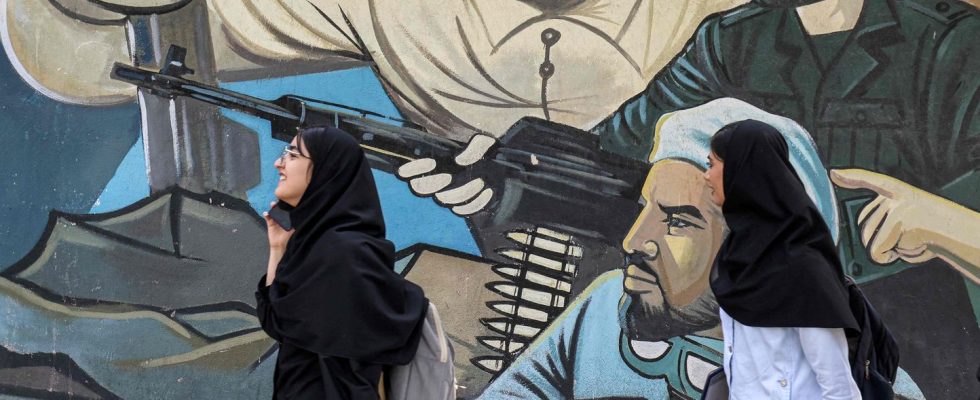And the Iranian population in all this? Since last Saturday and the response of the Islamic Republic of Iran to the Israeli attack on its consulate in Syria, analyzes of the feared escalation in the Middle East have multiplied. What about the position of the Iranian people on this conflict led by their leaders?
For a large part of society, “the Israeli question does not concern them directly” explains to 20 minutes Amélie Chelly, Iranologist, researcher at the Sorbonne Nouvelle and author of Blood Quran (editions du Cerf). She even suffers the direct, economic, financial and repressive consequences, adds Azadeh Kian, Franco Iranian, professor of sociology at Paris Cité University and author of Women and power in Islam (Michalon).
Woman, life, freedom… Choked?
If scenes of jubilation and explosions of joy were broadcast outside following the drone attack launched on Saturday against Israel, it is difficult to say that this is sincere and representative popular support. . On the contrary. “It is a minority, and even the regime’s militia, those who torture and rape,” bluntly states Bahareh Akrami, an illustrator of Iranian origin who runs a current drawing magazine. on the Mediapart blog.
This visual propaganda actually hides the majority unpopularity of the Iranian state among its population. We remember the months of large-scale demonstrations following the death of Mahsa Amini in September 2022. If this protest no longer results in the agitation of angry crowds in the streets of Tehran and elsewhere, it remains well-established in Iranian civil society. “There has been an expansion to all social classes and ages, and above all there is a representation of this movement as something which cannot have an end, a current which is destined to be lasting”, analyzes Amélie Chelly.
Repressed unpopularity
This protest has been expressed for some time through civil disobedience, particularly on the part of women who dared to go out without a veil despite the risk of punishment. But with the escalation of tensions between Tehran and the Jewish state, the Islamic regime has redoubled its efforts in repression by putting the moral police back on the streets from Saturday to repress any deviation from the wearing of the veil. “We see a lot of videos of women who are assaulted, sexually harassed, beaten. All those who testified on social networks were arrested,” says Bahareh Akrami. Because the priority of the regime is to maintain itself, and therefore prevent any sign of rebellion internally.
This anticipated tightening of the screws is accompanied by total intolerance towards criticism of the military strategy adopted by the Iranian regime: “the Revolutionary Guards have ordered that no one oppose their military strategy. Even journalists who dared to criticize the attack on social media saw their newspapers suspended. They are trying by all means to stifle any kind of protest inside Iran,” reports Azadeh Kian.
Weak on the inside, strong on the outside
The mullahs’ regime knows that it is indeed criticized. “He is afraid of his people and fears that in the event of war, they will not be supported within their borders,” estimates Azadeh Kian, which is why he is strengthening himself outside. Because these actions against Israel galvanize it in the eyes of neighboring Arab populations. The Iranian state appears to be “the ultimate bastion of anti-Zionist soft power when a large part of the Arab countries have normalized their relations with Israel”, underlines Amélie Chelly.
It is “seen as the only regime in the world to truly support the Palestinians,” says Azadeh Kian. The “exalted ones”, as Amélie Chelly calls them, those who revere the Islamic regime are in fact outside Iran, they are in Lebanon with Hezbollah, in Gaza with Hamas, in Yemen with the Houthis… The regime does not survive today Today “only thanks to these tensions that he himself creates”, summarizes the sociologist.
“Neither Gaza nor Lebanon”
If the mullahs need war to strengthen themselves and divert attention, right now it is a conflict that does not concern the Iranians. One of the slogans taken up during large-scale demonstrations in recent years reveals public opinion regarding the regime’s foreign policy: “Neither Gaza nor Lebanon, my heart goes to Iran”. In subtext: “leave us our economy, stop sending funds to Gaza for Hamas, to southern Lebanon for Hezbollah”. “They are not concerned as a people by what is happening in Gaza or Lebanon. This is not their fight. Why should Iranians be in conflict with Israel? », asks Azadeh Kian.
The main concern is the economic and financial situation. Already catastrophic, it got worse with the reprisals launched on Saturday. Inflation has increased, the exchange rate has worsened… A pill that goes badly knowing that part of the resources obtained by the sale of Iranian oil is intended for external proxies. “This population is only suffering the consequences of this foreign policy of the Islamic regime,” regrets Azadeh Kian. If the State takes advantage of this conflict to silence any internal dispute, “the population does not want to go back,” ultimately believes Bahareh Akrami. She sees popular anger as “a profound mass movement in society. This is a change that we haven’t seen before. People no longer believe in it, no longer believe in this regime. »

